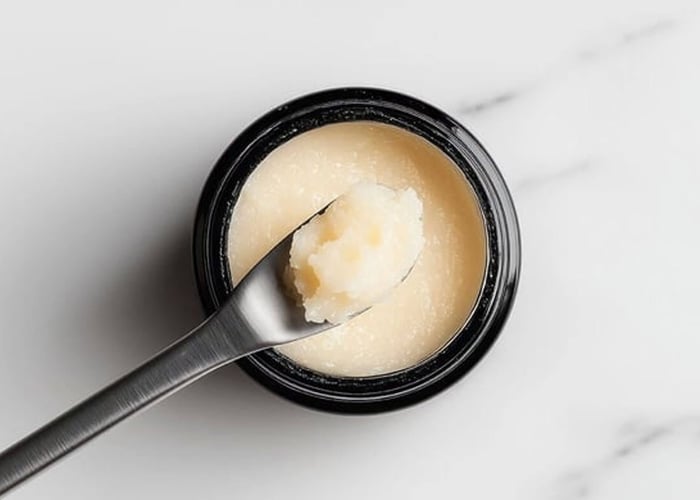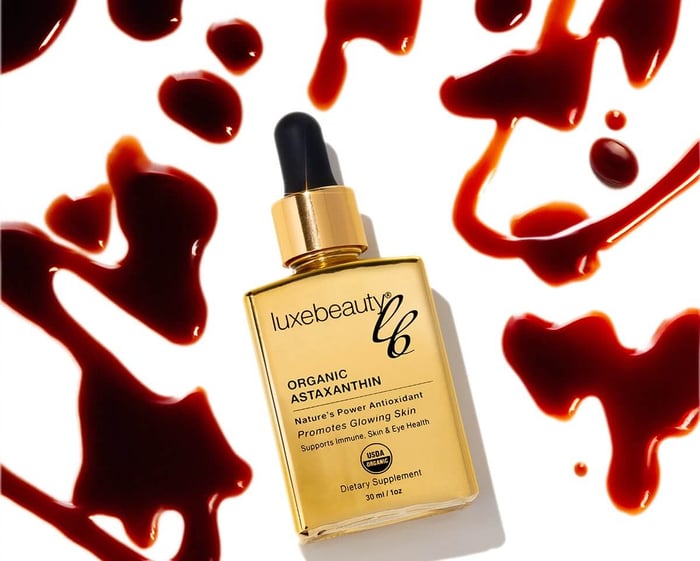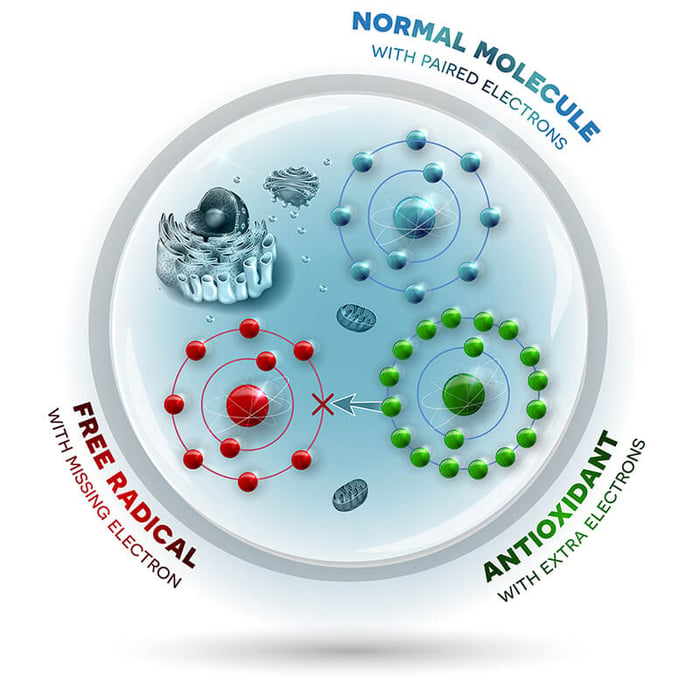Table of Contents
- What Is Tallow in Skincare?
- Is Tallow Good for Your Skin? Claims vs. Science
- Tallow and Acne: Helpful or Harmful?
- Does Tallow Help With Wrinkles and Anti-Aging?
- Tallow vs. Plant Oils: Which Is Better?
- The Problems With Tallow in Modern Skincare
- Why Luxe Beauty Chooses Antioxidants Instead
- Final Thoughts: Is Tallow Good or Bad for Your Skin?
- References
- FAQs
In the beauty world, trends come and go. Recently, tallow skincare — creams and balms made from rendered animal fat — has surged in popularity. Advocates say it’s “ancestral,” “biocompatible,” and “great for acne and wrinkles.”
But does science agree?
At Luxe Beauty, we’ve done the research and had customer ask us to help them after being so disappointed with what tallow did to their skin!
While tallow may sound natural, it falls short when it comes to anti-aging, transformative results, hydration, and protecting your skin from oxidative stress.
Here’s the truth about tallow in skincare — and why Luxe Beauty doesn't use tallow in our skincare and why we choose plant-based antioxidants like organic astaxanthin, raspberry seed oil, and rosehip oil and bioactive compounds like peptides and bakuchiol that actively fight aging.
What Is Tallow in Skincare?
Tallow is fat rendered from the tissue of cows, sheep, or other animals. Historically, it’s been used in:
Soap and candle making
Early moisturizers
Industrial uses like lubricants
Today, it’s marketed in skincare as a “natural” moisturizer that mimics the fatty acid profile of human skin.
While it can provide surface hydration, that doesn’t mean tallow is the best ingredient for long-term skin health.
Is Tallow Good for Your Skin? Claims vs. Science
The claims:
Tallow is “ancestral” and what our ancestors used.
Its fatty acids are similar to those in human sebum.
It creates a protective layer over the skin.
The science:
Moisture alone doesn’t prevent aging — oxidative stress does the real damage.
Tallow lacks significant levels of antioxidants, polyphenols, or vitamins that defend against free radicals.
Heavy animal fats may sit on the skin without offering true cellular protection.
💡 Translation: Tallow moisturizes, but it doesn’t protect, repair, or actively support skin biology.
Tallow and Acne: Helpful or Harmful?
Some claim tallow helps acne because it’s similar to human sebum. But the truth is more complex:
Tallow can oxidize when exposed to light, heat, and air, potentially irritating acne-prone skin.
It provides no antioxidants to calm inflammation or repair post-acne scars.
For sensitive or breakout-prone skin, antioxidant-rich oils (like rosehip and raspberry seed oil) are far more effective because they reduce oxidative stress and support healing.
Does Tallow Help With Wrinkles and Anti-Aging?
Wrinkles aren’t caused by a lack of fat. They’re caused by oxidative stress that breaks down collagen, elastin, and the skin barrier.
Tallow doesn’t provide the antioxidant defense needed to fight free radicals.
It may soften skin temporarily, but it doesn’t slow aging, protect collagen, or reduce fine lines.
Clinical studies instead point to antioxidants (like astaxanthin and polyphenols) as the most effective way to defend skin from wrinkles and photoaging .
Tallow vs. Plant Oils: Which Is Better?
When comparing tallow to plant-based oils, the difference is clear:
Tallow = fatty acids, minimal bioactives, risk of oxidation
Plant oils = rich in vitamins, polyphenols, and antioxidants that actively protect skin
✨ Examples of Luxe Beauty’s plant-based alternatives:
Raspberry Seed Oil → high in Vitamin E, protects against oxidative stress, natural UV defense
Pomegranate Seed Oil → rich in punicic acid, supports elasticity and repair
Rosehip Oil → Vitamin A + antioxidants for scar healing and regeneration
White Tea Extract → one of nature’s richest sources of polyphenols to protect collagen
Unlike tallow, these oils don’t just sit on the skin — they work with your skin’s biology to repair, protect, and rejuvenate.
The Problems With Tallow in Modern Skincare
Beyond performance, there are serious safety concerns with tallow-based products:
Oxidation risk: Animal fats spoil easily, creating rancid compounds that can irritate skin.
Purity & hygiene: Tallow is an animal byproduct; quality and cleanliness vary widely.
Lack of testing: Because most tallow products don’t contain water, many brands skip stability testing and microbiology testing. Oils and animal fats are still vulnerable to oxidation and contamination. Without proper testing, you can’t be sure what’s happening inside the jar over time.
Not cruelty-free: Tallow comes from the meat industry and does not align with modern ethical beauty standards.
Limited benefits: Tallow moisturizes but doesn’t provide antioxidants or bioactive compounds like peptides or bakuchiol that actively fight aging. Luxe Beauty formulations, in contrast, include:
Argireline® Peptide — known as “nature’s Botox,” helping smooth expression lines. We this peptide in our anti-aging serum.
Fision® WrinkleFix Peptide Complex — clinically shown to reduce fine lines and improve skin density. We use this powerful peptide in our Luxe Beauty night cream.
NaturePep® Sacha Inchi — a natural peptide proven to reduce sagging, contour the jawline, and smooth crepey skin. We use this transformative peptide in the Luxe Beauty Night Cream.
Bakuchiol — a plant-based retinol alternative clinically shown to reduce wrinkles and fine lines without irritation.This ingredients is found in our night cream.
Why Luxe Beauty Chooses Antioxidants Instead
At Luxe Beauty, our formulations are built around antioxidant defense — the real key to youthful, radiant skin.
A rare carotenoid from microalgae
Up to 6,000x stronger than Vitamin C in fighting oxidative stress
Protects against UV, blue light, and pollution
Clinically shown to reduce wrinkles, improve hydration, and support collagen
✨ Raspberry Seed Oil
Polyphenol-rich, high in Vitamin E
Helps repair and protect the skin barrier
✨ Rosehip & Pomegranate Oils
Rich in Vitamins A + C
Promote healing, reduce scars, and support elasticity
✨ Organic Avocado Oil
Packed with skin-loving nutrients: Vitamin E, potassium, and essential fatty acids
Deeply nourishes and restores the skin barrier
Enhances absorption of other antioxidants
Supports wound healing and calms inflammation
✨ White Tea Extract
Rich in catechins (antioxidants)
Protects collagen and reduces photoaging
Together, these antioxidants do what tallow cannot:
Neutralize free radicals
Prevent oxidative stress
Reduce wrinkles and fine lines
Support true cellular hydration
Promote long-term skin health from the inside out 🌿💎
Final Thoughts: Is Tallow Good or Bad for Your Skin?
So, is tallow good for skin?
👉 It can moisturize, yes.
👉 But for anti-aging, wrinkle defense, and skin repair? Science says antioxidants such as organic astaxanthin and peptides are far superior.
That’s why Luxe Beauty will never use tallow or animal fats. Instead, we focus on certified organic, plant-based, antioxidant-rich formulations that honor your skin’s biology and protect against the real cause of aging: oxidative stress.
Because your skin deserves more than byproducts. It deserves the best of nature and science — and that’s the Luxe Beauty Standard. 🌿💎
References
Tominaga K, et al. Skin improvement and UV-induced damage protection by oral astaxanthin supplementation. Carotenoid Science. 2009.
Yamashita E. The effects of astaxanthin on skin health. Nutrafoods. 2011.
Pandel R, et al. Skin photoaging and the role of antioxidants in its prevention. ISRN Dermatology. 2013.
FAQs
1. What is tallow in skincare?
Tallow is rendered fat from animals (usually cows or sheep) used in some skincare products as a moisturizer. While it provides fatty acids, it lacks the antioxidants and bioactive compounds that defend skin from aging and oxidative stress.







